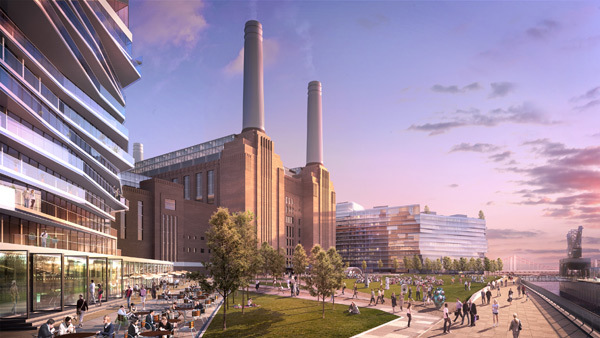
Battersea Power Station, as it could be a decade from now.
The long-running, often tragi-comic attempt to do something with Battersea Power Station took a major step forward last night when Wandsworth council
approved the latest redevelopment plans.The £5.5 billion proposal,
submitted a year ago by current site owner Real Estate Opportunities, and designed by architect Rafael Viñoly, would see the creation of 3,400 new homes and 330,000sq m of commercial space, including a hotel, shops, offices, and "one of the largest ballrooms in London". The "setting and character" of the building would be preserved by maintaining the existing space around it, and the two turbine halls converted into event and exhibition spaces. The four chimneys will be demolished and rebuilt, as they are now beyond repair. No such luck, however, for the Grade II-listed pumping station on the site perimeter, which English Heritage had
campaigned to save: it'll be torn down under these plans.The key to Wandsworth's approval was REO's agreement to pay £220m toward an extension to the Northern line from Kennington, which will involve a station at Nine Elms and a new terminus at the power station (neatly illustrated on this
tube map). The redevelopment also includes a riverbus pier and improved bus connections.Chief opposition to the project comes from the Battersea Power Station User Group, which pre-empted the decision in a press release entitled "
The plan by REO is all bad". Their objections are that the plan would spoil the power station by destroying original features, and (more worryingly) that the developer is in financial trouble and is using the plan as a way of destroying the building "by stealth".The BPSUG have their
own plans, drawn up in the 1980s, but time is ticking down, and going through another round of planning, consulting, and approval would delay work by years. REO, who will now seek investment from other sources, estimate that work on the plan will take at least a decade.

